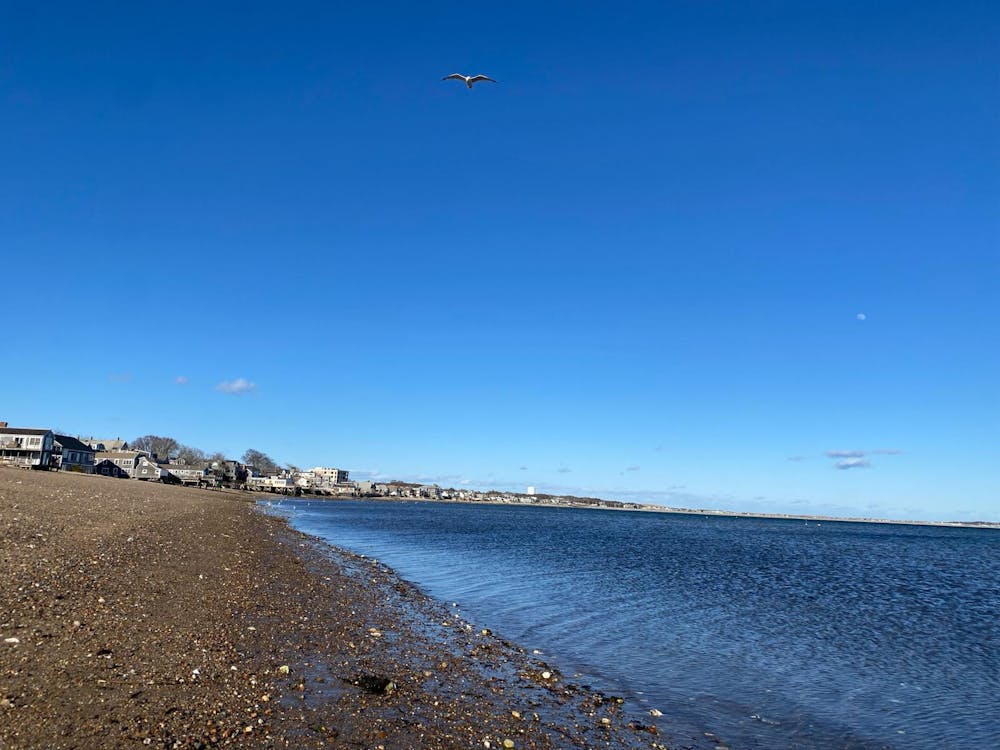
There is a strange peace to the sight of a beach town emptied.
Arriving at Cape Cod at noon in late March, we were served a sight of pastel storefronts and wooden walkways that wove around one another in a tangle of overlapping outlooks and porches. My roommate and I were the only passengers on the large bus into town. As we rolled in, the sea spread out beyond the window of our bus. Having road-tripped through the East Coast for the past week, we weren't unused to unusual circumstances. Two days before, we’d run through Manhattan at midnight on our friend’s birthday, rushing from the chaos of Times Square to catch a late night train at Penn Station. Two days before that, we’d been stalled in D.C. traffic for nearly an hour, caught in the midst of an unexpected Rock ‘n’ Roll marathon.
It wasn’t until the bus doors hissed open that it dawned on us why exactly the town was so empty. It was blisteringly cold. When we disembarked, frigid air whipped at our faces with such intensity that we were numb within moments. Still, the blue beyond the shore called us to take a closer look. By the shore, the ocean was forcefully distinct from the industrial palette of our past days in big cities. It was serene. Salt was stark in the air.
We walked sideways up the path to Main Street, fighting to haul our bags against the frozen wind. We’d checked the weather before. We figured it would be chilly, but we thought it would surely be the walkable sort. Each grappled step proved us very wrong. When we finally reached the diner, we were proper icicles. But it was a bright blue and white house, carefully curated with fresh flowers and fairy lights, humming with Taylor Swift’s Lover album — who could be mad in a beach shack? The owner of the diner was an incredibly jolly person, and we’d soon find that the town had the nicest locals — a woman on the beach offered to drive us up to a popular spot for seafood, and a bartender called up three different restaurants after we let him in on our late-night hunt for good dessert.
Our walk up Main Street proved that we’d entered a ghost town, albeit the cutest little New England-hideaway-of-a ghost town. Wooden signs were hung along the road, most of them carved postings for homemade ice cream and shell jewelry — many of which were closed. More than half of the restaurants in town were shut down, with signs taped to their doors thanking everyone for a great season.
After dropping our bags at the inn, we walked the beach for real. I froze my toes off testing out the cold water (entirely worth it). My roommate devised an ingenious technique for minimizing face-battery against the wind: walking backward. What a sight we must’ve been to the locals who lived along the shore — two girls walking backward along their freezing beach, one of whom was barefoot and the other wearing a hood that was pointed on top like a goblin cloak.
We stopped by their toasty local library which was giving away free books and magazines, with old copies of The New Yorker stacked high in piles (a shameful share of which I was thrilled to hoard). We ate our fill of seafood, the crab burgers with aioli and lemony fish sandwiches warming us right up. The restaurants we visited were packed with locals, which couldn’t have been a bad sign. After we found the one fudge store that stayed open all year, we collected our goods and turned in early for a movie back at the hotel, where we cranked up the heat.
There was something highly likable about visiting Cape Cod during the off-season. Without any vision for what Main Street might’ve looked like flooded with tourists, it was easy to roam and enjoy the town without any rush.
People walked slower on the Cape. The streets were dotted with only the occasional car, instead of its usual droves. They were so sparse that we often walked on those winding cobbles, playing our own music aloud to compliment the chill, beachy vibes. It was easy to see the ocean in those gaps between stores as we wandered through Main Street. Even in the cold, this town, with its stubborn pastel and endearing hospitality, was so vibrant that it hardly felt empty at all.
I found it curious to think about the locals who lived on Cape Cod all year, who stayed whether it was on or off season, with their mild temperaments and steady kindness. There had to be a beauty to sticking by a thing while it hibernated, trusting that it would once again become its best.
Kaitlin Tan is a sophomore from Macao majoring in Writing Seminars and Cognitive Science. In her column, she tries to parse through the everyday static to find something substantial to hold onto.





